Contact UsCONTACT
Please feel free to contact us if you have any questions or concerns.
Inquiry FormStories
STORIES
SERIES EMBARK
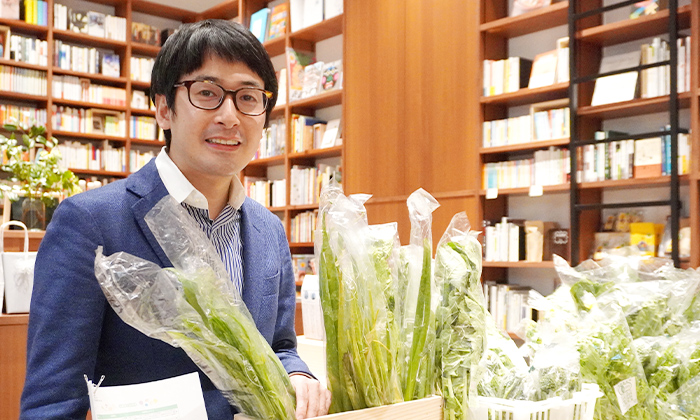
Creating a form of agriculture that will last for 100 years. Sakano Tochu Co., Ltd. was started with this in mind. This year marks the 12th year since the company started its business of selling vegetables harvested using farming methods that do not depend on pesticides or chemical fertilizers, with the aim of spreading environmentally friendly farming practices, and with new farmers as partners. The company had three employees when it started, but has now grown to have 50 employees. As the concept of "sustainable" is finally becoming widespread in society, we asked Mr. Kunihiko Ono, the president of the company, who has been working on this theme since early on, to talk about the company's various current initiatives. (Interviewer: Mae Kori)
It's a combination of factors! I can't really say, but I guess one of them is that I went backpacking around the world when I was a student. When you go out into the world, you can actually see many different societies. For example, in Tibet, the ecosystem is very simple, including humans, because there are only a few species of creatures that can adapt to the high altitude. Yaks eat the undergrowth, yak dung is burned for fuel, humans heat the milk, and the ashes from that heat the milk, which in turn nurtures the undergrowth. At the same time, I have always wondered why people can only live while inconveniencing the natural environment, animals, and various other things. I have always wondered why people can only live while inconveniencing the natural environment, animals, and various other things, and I wondered if I could work toward a sustainable society in some way. I wondered if I could work toward a sustainable society in some way. In particular, modern agriculture is very ingenious in its pursuit of efficiency and short-term yields, but there is little focus on reducing environmental impact. So, I decided to create a "form of agriculture that will last for 100 years with a small environmental impact" by myself, and to make it my job to create such a society.
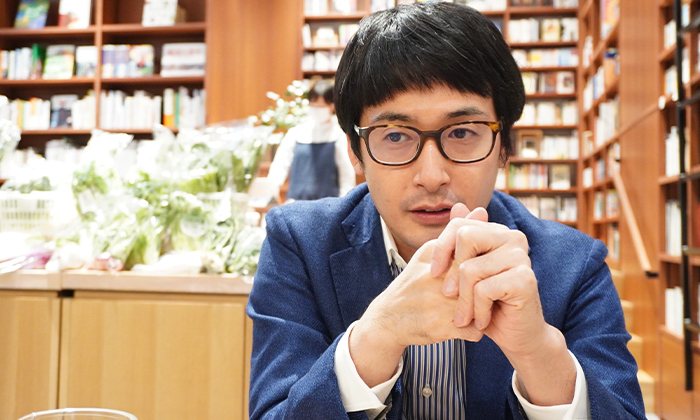
To start a business, you still need funds, so after graduating from university, I first worked for a French financial institution for two years and a bit to save up enough money, and after retiring, I started my own business in Kyoto. I started my current company with three people, and for a few years, we used our own funds to make ends meet, and we were able to make ends meet within a small framework. We began to attract a certain amount of attention for what we were doing, but gradually we began to wonder if we were not actually solving various problems in society. I gradually began to feel that we were not actually solving the various problems of society. So we decided to change into a company that could create a stronger impact, and we raised a seed in our sixth fiscal year. Generally, I think most companies raise funds at an earlier stage, but we raised our first round of funding in our 6th term, Series A in our 8th term, and Series B in our 10th term, and we had Kyoto-iCAP join us for Series B.
Currently, we deal with about 300 farmers mainly in the Kansai region, and nearly 90% of them are newcomers to farming. The world of agriculture is quite closed. It is easy to start farming if your parents are farmers, but it is very difficult for people whose parents are not farmers to start farming. Even if you want to expand agriculture with less burden on the environmental system, in Japan, it is honestly difficult to get existing farmers to change their minds, partly because of the aging population. On the other hand, about 70% of newcomers to farming are of the opinion that "if I'm going to do it anyway, I want to do it organically," which makes it easier for us to form partnerships with them. The question is, will they be able to make a living? The question is, will they be able to make a living?
Yes, they did. But in reality, most of the new farmers who started farming were not able to make it financially viable; for example, they often quit when they ran out of savings. Even if they produce really high-quality, tasty vegetables, they cannot put them into the existing distribution system because their production is unstable and cannot keep up with the volume. In the first place, there are no distribution companies that want to handle such unstable produce in such small quantities. That is why our company has created a system that allows us to distribute at a fair price, even with small and unstable production, as long as the quality is good. I think we are probably the only company in Japan that does this.
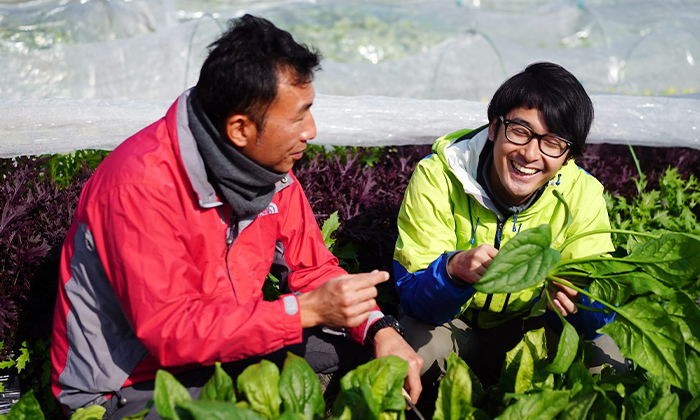
First, we expanded our sales channels by focusing on regular home deliveries to individual households. Because the vegetables are produced by a variety of farmers with different ideas, there are different varieties, and the regular deliveries are rich in variety, so we never get bored. We have many repeat customers who receive vegetables of unfamiliar varieties but who find them tasty and interesting. From there, we began to wholesale to restaurants and department stores. Another of our strengths is that we have 100% traceability, which allows us to accurately feed back customer feedback to the producers. If a farmer is praised for the taste of his eggplant, we can ask him if he would like to focus on eggplant in this field. We work with them to make planting plans with sales channels in mind, and devise ways to increase profitability. By making such efforts, I believe that we are able to continue to buy vegetables at a reasonable and stable price.
I would like to create a system in which each individual's character, in other words, his or her humanity, can be fully utilized, rather than having an organizational chart and assigning people to these positions. I think that it is not good to put labels on people. The overwhelming majority of young people in Japan, myself included, have lived in an environment where they were told "you can't do this or that," especially in schools and other educational settings. These are kids who have managed to survive that environment, so what they are talking about now, are they speaking the truth coming from the inside? Are they just speaking well to avoid problems? I think we need to look at the essence of that. To move people, I think it is very important to be able to listen without missing something like an outpouring of humanity. In fact, new businesses such as "Umi no Mukou Coffee" were born from such voices.
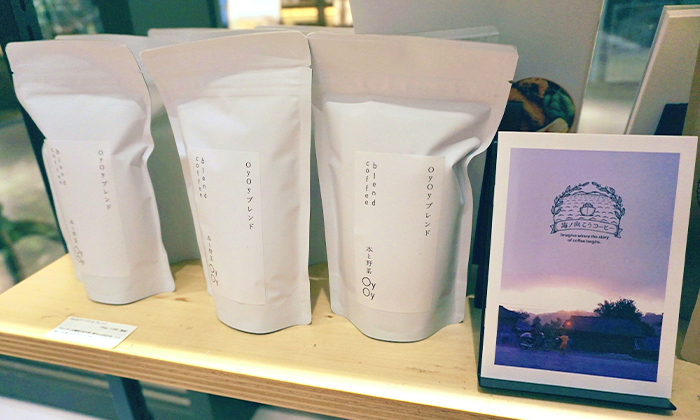
Many people have the impression that we are a company that is expanding into many different things, but that is not true at all. I myself believe that human beings can do only one or zero things at most. Even the probability of survival is not high, but if power is dispersed, the probability of survival will decrease even further. Basically, I am only thinking about how to expand agriculture with a small environmental impact. That is the starting point for everything. We aim to design our restaurants, retail, mail-order, and overseas businesses so that they seem to operate separately, but are fundamentally connected and mutually beneficial. The root is one, and each business is there to strengthen each other. We would like to continue to engage in businesses that are useful for "sustainable agriculture" in the future.
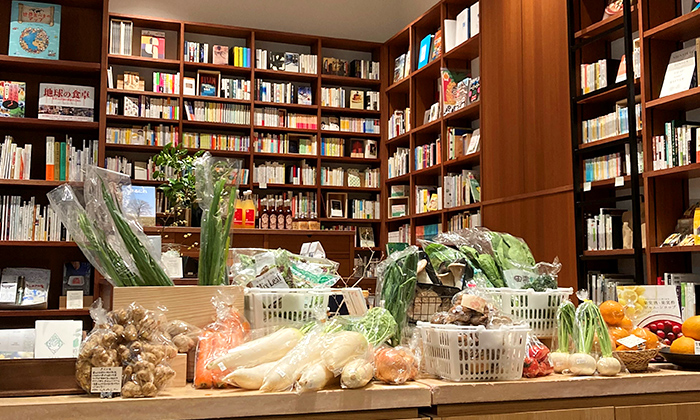
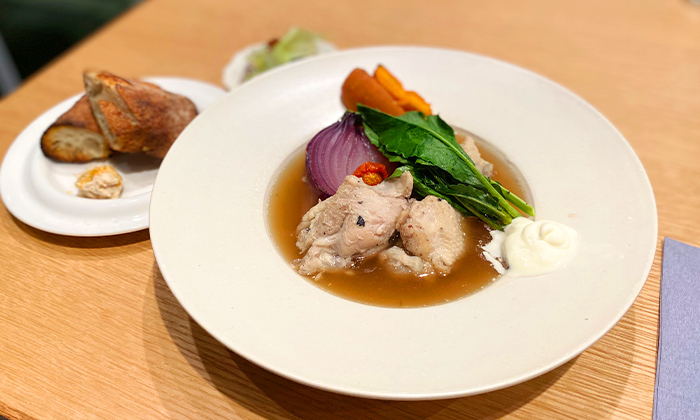
Since I was young, I myself have lived with a sense of discomfort in various ways, both at school and at home. I believe that everyone feels this discomfort to some degree or another. First of all, I would like people to continue to have that sense of discomfort, and to talk about it, rather than just rounding it up and pretending that it did not happen. In a sense, I believe that a sense of discomfort can be a catalyst for something to happen or a driving force for a project to move forward. Also, I am of the school of thought that there can only be one point of breakthrough in everything. Which point will I break through? Deciding on that is an important first step for a business. In my case, "I want to expand agriculture with a small environmental impact," has always been my single point, and I intend to continue to break through to that point without wavering.
(Interviewed in March 2021. Affiliations, positions, etc. are as of the time of the interview)
Don't think of SAKA NO TOCHU Co., Ltd. as just another vegetable online shopping company. Their customers are mainly farmers run by young farmers. This is because they want to encourage young farmers to do their best and put a stop to the aging of the farming population and the decrease in the number of farmers, which is the biggest issue in Japanese agriculture. In addition, "coffee from beyond the sea," which is growing into a popular product, is grown in the tropical rainforests of Southeast Asian countries. Instead of slash-and-burn agriculture, in which forests are burned down to grow cash crops, the company is buying coffee beans that can be grown in the forests as they are. All of SAKA NO TOCHU's businesses are designed from the perspective of "solving social problems.
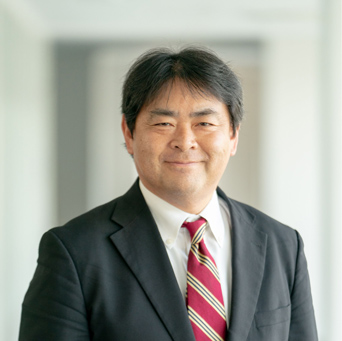
Osami Kono

SAKA NO TOCHU Co., Ltd. Website
Please feel free to contact us if you have any questions or concerns.
Inquiry Form